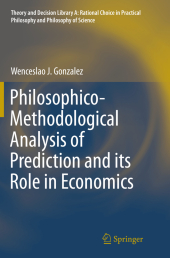 Neuerscheinungen 2016Stand: 2020-02-01 |
Schnellsuche
ISBN/Stichwort/Autor
|
Herderstraße 10
10625 Berlin
Tel.: 030 315 714 16
Fax 030 315 714 14
info@buchspektrum.de |

Wenceslao J. Gonzalez
Philosophico-Methodological Analysis of Prediction and its Role in Economics
Softcover reprint of the original 1st ed. 2015. 2016. xx, 362 S. 1 SW-Abb. 235 mm
Verlag/Jahr: SPRINGER, BERLIN; SPRINGER INTERNATIONAL PUBLISHING 2016
ISBN: 3-319-38005-2 (3319380052)
Neue ISBN: 978-3-319-38005-6 (9783319380056)
Preis und Lieferzeit: Bitte klicken
This book develops a philosophico-methodological analysis of prediction and its role in economics. Prediction plays a key role in economics in various ways. It can be seen as a basic science, as an applied science and in the application of this science. First, it is used by economic theory in order to test the available knowledge. In this regard, prediction has been presented as the scientific test for economics as a science. Second, prediction provides a content regarding the possible future that can be used for prescription in applied economics. Thus, it can be used as a guide for economic policy, i.e., as knowledge concerning the future to be employed for the resolution of specific problems. Third, prediction also has a role in the application of this science in the public arena. This is through the decision-making of the agents - individuals or organizations - in quite different settings, both in the realm of microeconomics and macroeconomics.
Within this context, the research is organized in five parts, which discuss relevant aspects of the role of prediction in economics: I) The problem of prediction as a test for a science; II) The general orientation in methodology of science and the problem of prediction as a scientific test; III) The methodological framework of social sciences and economics: Incidence for prediction as a test; IV) Epistemology and methodology of economic prediction: Rationality and empirical approaches and V) Methodological aspects of economic prediction: From description to prescription. Thus, the book is of interest for philosophers and economists as well as policy-makers seeking to ascertain the roots of their performance. The style used lends itself to a wide audience.
Introduction: The Problem of Scientific Prediction and its Role in Economics.- Part I: The Problem of Prediction as A Test For A Science.- Chapter 1: The Philosophico-Methodological Standpoint: The Issue of Prediction as a Requisite for Science.- Chapter 2: Characterization of Scientific Prediction and its Kinds in Economics.- Part II: The General Orientation in Methodology of Science and The Problem of Prediction As A Scientific Test.- Chapter 3: Falsificationism and the Methodological Levels on Prediction.- Chapter 4: Prediction and Novel Facts in the Methodology of Scientific Research Programs.- Part III: The Methodological Framework of Social Sciences and Economics: Incidence for Prediction as A Test.- Chapter 5: From Erklären-Verstehen to Prediction-Understanding: The Methodological Framework for Prediction in Economics within Social Sciences.- Chapter 6: Methodological Approaches within Economics: The Perspectives on Prediction of Some Nobel Prize Winners.- Chapter 7: The Problem of Prediction in Economics from the Perspective of Action Theory.- Part IV: Epistemology And Methodology Of Economic Prediction: Rationality And Empirical Approaches.- Chapter 8: Rationality in Economics and Scientific Prediction: The Role of Economic Rationality in Prediction.- Chapter 9: Rationality and Prediction in Experimental Economics: An Analysis of Reinhard Selten´s Approach.- Part V: Methodological Aspects Of Economic Prediction: From Description to Prescription.- Chapter 10: Methods of Prediction in Economics.- Chapter 11: Evaluation and Limits of Prediction in Economics.- Chapter 12: The Relation between Prediction and Prescription in Economics.- Bibliography.- Index of Names.- Subject Index.


